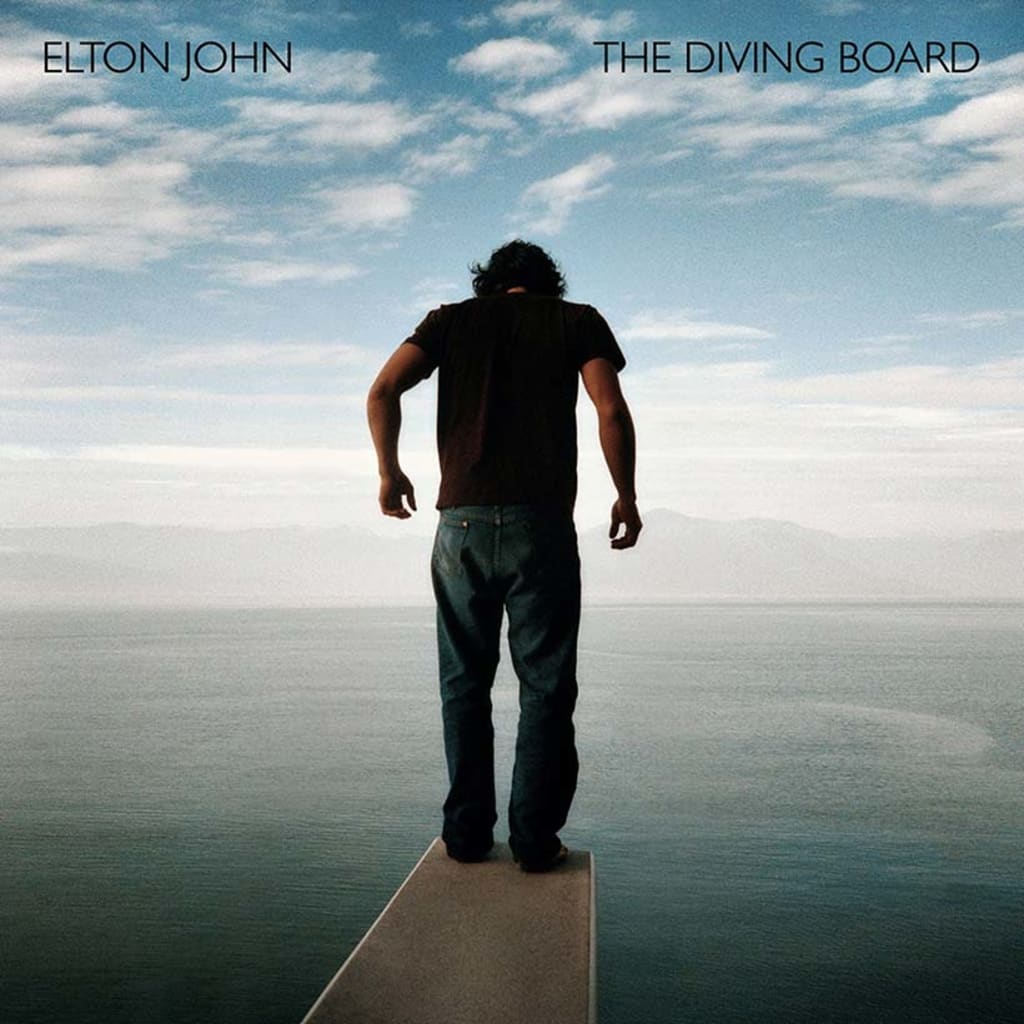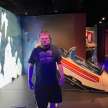'The Diving Board'
Elton John's most piano-driven album

For his next album following his very successful collaboration with Leon Russell The Union, Elton John once again turned to producer T-Bone Burnett, who suggested that Elton return to the piano-bass-drums lineup that had served him well in his early career. Accordingly, the majority of this album is anchored by Elton on piano, Raphael Saadiq on bass , Jay Bellerose on drums (lyricist Bernie Taupin considers Bellerose one of his favorite drummers according to his memoir, "Scattershot".) and Keefus Ciancia on keyboards, with Davey Johnstone and the touring band left on the sidelines. Bernie Taupin wrote all the lyrics for the album in just a few days time. Elton described it as his most exciting solo record in a long time. The album was originally to be released in the Fall of 2012 but numerous delays pushed its release to the Fall of 2013.
The album opens with the wistful "Oceans Away" a tribute to the heroes, living and dead who served in the second world war. Bernie dedicated the song to his father, Captain Robert Taupin and the "great generation."
"Oscar Wilde Gets Out" was the first melody Elton wrote for the album because he said, "The title intrigued me." The result is a tasteful mid-tempo ballad that features the talents of Stjepan Hauser and Luka Sulic, known collectively as the 2 Cellos, an act that Elton discovered on YouTube and subsequently invited to tour with him. This was their first appearance on an Elton album.
"A Town Called Jubilee" is another mid-tempo, somewhat gospel-inspired narration about poor farmers that features prominent tambourine from Jack Ashford, tambourine player for the legendary "Funk Brothers," the group of session musicians for Motown Records who played on more number 1 hits than Elvis, The Beatles, The Beach Boys and the Rolling Stones combined.
"The Ballad of Blind Tom" is Bernie's tribute to savant African-American pianist "Blind Tom" Wiggins, Born a slave Tom lived from 1849 to 1908, leaving no recorded legacy to speak of but a legendary biography that is frequently retold. The story is recounted from Tom's justifiably angry point of view.
"Dream # 1" is the first of three similarly named short piano interludes, a device that Elton said he was very fond of in album promotion. The first "Dream" leads into "My Quicksand" a piano-driven ballad which features Elton (Bernie?) at his most confessional. Elton considers this one of the best ballads he's ever done.
"Can't Stay Alone Tonight" is as close to upbeat as the album gets in its first half and was released as the albums third single, again featuring Jack Ashford on tambourine accenting Jay Bellerose's backbeat. Like "Town Called Jubilee," the song features backing vocals arranged by Bill Maxwell and sung by Bill Cantos, Alvin Chea, Louis Price and Perry Morgan.
"Voyeur" was at one point going to be the album's title track, though the initial title track was to be "The Diving Board," which is obviously how it played out. By this point, it becomes clear that this album was to be pretty much all in the slow-to-mid-tempo range and the piano was to be the primary vehicle for melody. With a sameness of approach beginning to emerge on this album the lyrics were beginning to be the main determinant of a song's success. This is not one of Bernie's more developed lyrics and ergo this song falls somewhat flat.
"Home Again" was the album's first single, released well ahead of the album on June 24, 2013. The song features a horn section arranged by Darrel Leonard and consisting of Darrel Leonard and Chuck Findley on flugelhorns, George Bohanon on baritone horn, Bruce Fowler on trombone and William Roper on tuba. The song registers as a universally experienced call of nostalgia, for better or worse.
"Take This Dirty Water" marks the rare appearance of electric guitar on this album, here played by Doyle Bramhall II. Also appearing on this relatively upbeat number are Bill Maxwell's backing vocalists this time featuring Bill Cantos, Carmel Ecchols, Judith Hill and Rose Stone.
"Dream # 2" leads into "The New Fever Waltz," whose shimmering melody makes it an album highlight. It again features the 2 Cellos and Darrel Leonard's horns in addition to the main rhythm section; it boasts a cryptic but interesting lyric, but it's the melody that brings this one home.
"Mexican Vacation (Kids In The Candlelight)," the album's second single and another uptempo number with a gospel-inspired bluesy feel. An up-tempo number, once again featuring Jack Ashford's tambourine and Bill Maxwell's backing vocalists.
"Dream # 3" features snare, tom and cymbal rolls by Jay Bellerose to accompany Elton's lead piano, and finally leads into the title track. "The Diving Board" which features Hammond B-3 organ by jazz pianist Larry Goldings (who provided backing for James Taylor's One Man Band). The song also features Darrel Leonard's horns, and provides a nice coda to the album, with its lyrics featuring the "sink-or-swim" aspect of making records and performing to large audiences.
The album received generally positive reviews--and in particular a glowing review by Robert Hillburn, who had reported on Elton's debut at the Troubadour for the Los Angeles Times 43 years earlier. Hillburn compares the album with Dylan's resurgence at the turn of the century and suggests John is signalling a similar resurgence.
About the Creator
Sean Callaghan
Neurodivergent, Writer, Drummer, Singer, Percussionist, Star Wars and Disney Devotee.






Comments
There are no comments for this story
Be the first to respond and start the conversation.